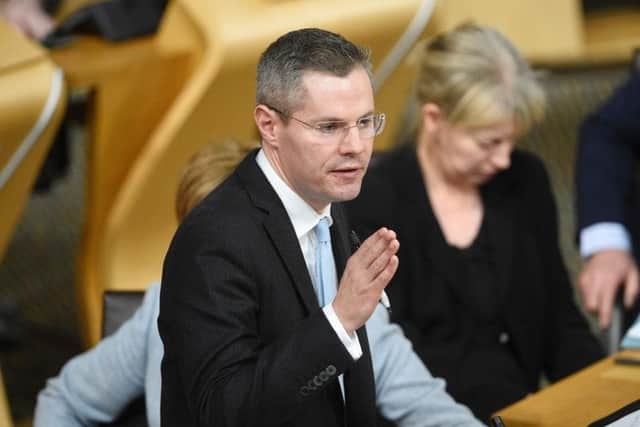Tax chiefs warning over ‘widening gap’ between Scotland and UK
The Chartered Institute of taxation (CIOT) says further income tax divergence between Scotland and the rest of the UK will leave a tranche of higher and middle earning Scots with a marginal tax rate of 53 per cent compared with 42 per cent south of the Norder.
Holyrood now has control over income tax in Scotland and the new regime sees high and middle earners pay more than elsewhere in the UK, while those on lower salaries.
Advertisement
Hide AdAdvertisement
Hide Ad

Finance secretary Derek Mackay’s spending plans for 2019/20 mean the Higher tax rate in Scotland of 41 pence has been frozen in line with inflation meaning it applies at salaries of £43,430. Elsewhere in the UK, the higher rate applies at £50,000 and is only 40 pence, meaning Scots high and middle earners face an effective tax hike.
Alexander Garden, chair of the CIOT’s Scottish Technical Committee, said it was issuing the warning to mark the the start of the new tax year at the beginning of April.
“It is important that the practical realities of income tax divergence are highlighted to taxpayers so they are aware of what the changes may mean for them,” he said.
“These changes aren’t new, but they are likely to increase in prominence as the tax systems on either side of the border continue on their divergent paths.
“Taxpayers receiving marriage allowance because their partner or spouse is earning less than the personal allowance will lose their eligibility if their income exceeds the Scottish higher rate threshold of £43,430. In contrast, they would continue to be eligible were they to live elsewhere in the UK, where the higher rate threshold will increase to £50,000.”
Responding to the claim Cabinet Secretary for Finance, Economy and Fair Work Derek Mackay said: “Most Scottish taxpayers will pay less income tax next year than if they lived elsewhere in the UK. Scottish taxpayers who fall into the starter, basic and intermediate rates will be eligible for marriage allowance on the same basis as elsewhere in the UK.
“National Insurance remains reserved to Westminster and we urge the UK Government to take into consideration the differing tax rates in Scotland. Overall, the wide range of free to access public services available in Scotland ensures the best deal for Scottish taxpayers.”
The UK-wide nature of national insurance contributions, also creates a quirk in the system with income tax which is devolved to Scotland. It means taxpayers north of the border with income between £43,430 and £50,000 will have a combined rate of 53 per cent (41 per cent Scottish income tax and 12 per cent national insurance contribution), compared with 42 per cent in the rest of the UK.
“The widening gap between the Scottish and UK higher rate thresholds is likely to push more taxpayers into this bracket in the year ahead,” Mr Garden said.
